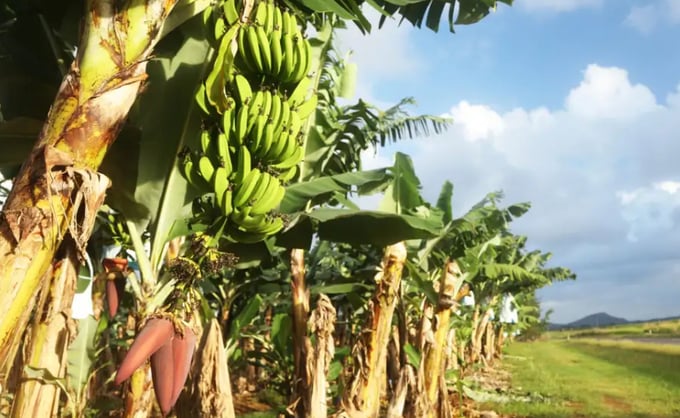November 25, 2025 | 22:51 GMT +7
November 25, 2025 | 22:51 GMT +7
Hotline: 0913.378.918
November 25, 2025 | 22:51 GMT +7
Hotline: 0913.378.918

Most banana plants are vulnerable to the fungal disease TR4.
A genetically modified banana has been approved for growing on farms for the first time. Regulators in Australia and New Zealand have given the go-ahead to a strain of the Cavendish banana altered to be resistant to a devastating fungal disease that has spread to many countries worldwide.
The Office of the Gene Technology Regulator in Australia issued a licence permitting the commercial growth of the modified banana on 12 February.
On 16 February, Food Standards Australia New Zealand approved it as a food, concluding that it is as safe and nutritious as conventional bananas. The food ministers of Australia and New Zealand can request a review of the decision in the next 60 days. If they don’t, the approval will be final.
The first banana to be widely eaten in Western countries was a variety called Gros Michel. But by the 1950s, the spread of a Fusarium fungus strain called tropical race 1 (TR1), which causes Panama disease, forced farmers to switch to the Cavendish banana. Although it reportedly doesn’t taste as nice as the Gros Michel, the Cavendish is highly resistant to TR1.
Now, another strain of Fusarium, called TR4, is spreading worldwide. It can kill many varieties, including the Cavendish.
A team led by James Dale at the Queensland University of Technology, Australia, created the resistant strain of banana, called QCAV-4, by adding a gene from a wild banana.
This decision is “a very important step towards building a safety net for the world’s Cavendish bananas from TR4 which has impacted many parts of the world already”, Dale said in a statement.
In Australia, quarantine measures are currently limiting the spread of TR4, with only a small number of outbreaks each year. So, for now, there are no plans to grow the QCAV-4 banana on a large scale or to sell it to consumers.
However, other countries where TR4 is more of a problem may decide to adopt the genetically modified banana. Dale’s team now plans to use CRISPR gene editing to make the QCAV-4 banana resistant to another major fungal disease called black sigatoka, which could mean it is even more appealing to farmers.
A team in Kenya has already used CRISPR to create a strain of the Gonja Manjaya variety that is free from banana streak virus – a pathogen that integrates itself into the genome of bananas.
Genetically modified (GM) crops are now widely grown in many countries worldwide, but in some places, such as the UK and European Union, few have been approved for farmers to grow.
In Australia, only four GM crops have previously been approved. They are a safflower whose oil has a higher level of oleic acid, and herbicide-resistant strains of rapeseed (canola), Indian mustard and cotton.
However, Australia and New Zealand have approved a wider range of GM crops and products for eating, similar to the situation in the UK and EU.
newscientist

(VAN) Brazil's COP30 presidency pushed through a compromise climate deal on Saturday that would boost finance for poor nations coping with global warming but that omitted any mention of the fossil fuels driving it.

(VAN) Poultry farmers in the UK have been warned that they could face one of the worst winters yet for bird flu.

(VAN) Prices of main-crop paddy have risen sharply, with jasmine rice hitting 16,100 baht per tonne — the highest level in years.

(VAN) In Brazil, FAO unveiled a series of reports and initiatives showing how sustainable agrifood systems are a solution to the climate crisis.

(VAN) With names like neodymium and dysprosium, rare-earth elements sound exotic — and their perceived scarcity has only added to the mystique.

(VAN) In a new study published in Trends in Biotechnology, researchers used a gene-editing technology called CRISPR to increase a fungus's production efficiency and cut its production-related environmental impact by as much as 61%- all without adding any foreign DNA.

(VAN) A top official in Beijing’s Cop delegation says China is committed to clean energy – but US’s absence is a problem.